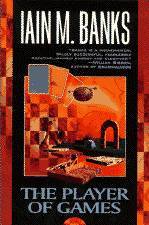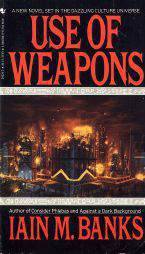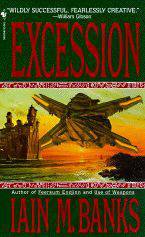

|
Scottish author Iain Banks' first novel was published in 1984. Since then, he's written science fiction under the name "Iain M. Banks" and mainstream fiction under the name "Iain Banks". His science fiction mostly focuses on a future interstellar civilization called The Culture, characterized by high technology, vast starships housing millions of people, and brilliant and manipulative computer Minds whose means and ends are often hidden from and alien to the humans. The stories revolve around both humans' reactions to the Culture they live in, and the reactions of humans and outsiders when outside entities come into contact with the Culture. Fans of literate, high-tech hard science fiction or stories which involve byzantine plots or conspiracies will probably enjoy his work. |
||
| Click on a book's image or title to order from Amazon.com |

The Player of Games
Bantam Spectra, PB, © 1989, 296 pp, ISBN #0-06-105356-2Reviewed January 2001
Jernau Gurgeh is one of the Culture's best game-players. He plays every game in the star-spanning civilization, and plays them all well. In any given game, there are perhaps a few people who could beat him, but they're specialists; he's a generalist, and can hold his own at anything.
Gurgeh has lived almost all his 70 years on Chiark Orbital, playing, teaching, writing papers about games. He's happy there and sees no reason to leave. He's infatuated with a young woman named Yay Meristinoux who doesn't return his interest, and he's friends with a drone named Chamlis Amalk-ney, and a more eccentric drone named Mawhrin-skel. One day, however, he plays a young prodigy named Olz Hap at Stricken, and is tempted by Mawhrin-skel to cheat, to have the drone learn where her hidden pieces are so he can score the most dramatic victory in the history of the game. He yields to temptation, wins the game, but doesn't score his historic victory.
Feeling sick at heart for having cheated, he's further brought low when Mawhrin-skel blackmails him into helping the drone rejoin Contact. In the process, Gurgeh is recruited by Contact to go play in the great tournament of the Empire of Azad. The Empire is a rare empire that's lasted long enough for the Culture to contact, and the reason seems to be that the game of Azad plays a critical role in the governing and unity of this civilization. Gurgeh travels to the empire with a protocol drone named Flere-Imsaho and learns the amazingly complicated game in two years. He begins to play in the tournament, which will ultimately determine the identity of the Emperor. Along the way, he learns how Empire differs from Culture, and about the reaction of the Azad people to his progress in the tournament.
The Player of Games is in many ways a better introduction to Banks' Culture novels than the other two books I've read by him, Use of Weapons and Excession: The separation of Minds from humans, with drones filling the cultural space between them, is clearly presented, as is the hedonistic yet opportunistic lifestyle that many Culture humans live. Gurgeh is a fine contrast to his fellows, as he's lived just long enough and accomplish just enough great things to feel restless and uncertain of what the Culture can offer him at this point. Hence, he takes the opportunity - blackmail or no - to work for Contact.
In doing so, though, we're presented with the other face of the Culture: The manipulation which the Minds engage in to further their ends. Gurgeh is clearly being manipulated, though exactly how is never clear, and there's always the nagging possibility that if Gurgeh actually gets into serious trouble, then that itself might further the Minds' aims and they might not bail him out (even if they could). One imagines that living in the Culture, you either become very paranoid, or very nonchalant, or try to put yourself in a position where you aren't very important or valuable.
The centerpiece of the book is the Empire of Azad and the game of Azad. The Empire is thoroughly expansionist and militaristic, and Banks uses this to satirize the nastier aspects of 20th century western culture (though the satire is very black and biting). The game, on the other hand, never comes across as much more than a game (despite repeated attempts to make it seem more significant), and in this way Banks sets up a very frustrating story, since Azad itself sounds fascinating, but of course Banks doesn't - and, to be fair, can't - give us more than a fleeting glimpse of how Azad is played.
Gurgeh himself varies between being something of a lost soul looking for fulfillment, and being something of a cipher who lives to play games. The book isn't very successful as a character study, but then, it's really more of a cultural study than a character study anyway. Gurgeh is the lens through which we see the worlds Banks wants us to see.
It's also interesting to contrast The Player of Games with Use of Weapons. Weapons' theme might be simply stated as, "You can't win." Player's theme is along the lines of, "Maybe you can win, but you might not know it's possible, and it will be very hard."
The Player of Games is a thought-provoking and at-time very powerful book, but it does feel unsatisfying in some regards, and it falls short of being a great book.

Use of Weapons
Bantam Spectra, PB, © 1990, 389 pp, ISBN #0-553-29224-2Reviewed April 2000
Use of Weapons is the first Iain M. Banks book I've read, and it's the one I've most consistently heard is one of his better ones. It's a pretty good piece of space opera SF, with a lot of universe-building as its underpinnings, and a pretty good character drama.
Cheradenine Zakalwe (what a great name!) is an agent of the Culture. The Culture is a starfaring human society which is governed to some not-inconsiderable degree by its artificially intelligent machines. (How all this actually works is left fuzzy; it's not entirely clear whether the Culture stories are set in the far future or whether present-day Earth is just another relatively-primitive human world set in this universe.) The Culture interacts with other human and alien cultures to varying degrees, usually trying to prevent wars and to make everyone live in harmony and comfort. They do this usually through subterfuge and manipulation, rather than through force and warfare.
Zakalwe is one of the best agents of Special Circumstances, a group which intervenes when a situation gets out of control. Zakalwe is a warrior who is sent into situations to accomplish a task, or to lead an army against another army - though not always in order to actually win. Special Circumstances often keeps him in the dark regarding the goals of his mission.
The book's structure is peculiar in that it alternates chapters involving a "present day" mission for which Zakalwe is brought out of retirement by his fellow agent Diziet Sma with chapters which provide vignettes about Zakalwe's history and origins in reverse order. The books gets off to a slow start, as Sma is not a particular interesting character, but Zakalwe is interesting, in his neurotic, eccentric, yet highly competent way, and the book feels alive whenever he's on stage.
It emerges that Zakalwe has lived for two centuries (half of that in real time, the other half in relative time), and we learn about Zakalwe's sense of morality, and his resignation from the Culture several years earlier. We see snippets of various missions he's performed for the Culture, some of which were very costly to him personally, clearly shaping his outlook towards the Culture. And the story of his early - and critically formative - years slowly emerges over the course of the book.
"Meanwhile", Zakalwe is sent in to contact an old friend of his to try to avert a major interstellar war, and he has to navigate hostile forces to make contact, and survive the ensuing events to gain the reward the Culture has promised him for this mission.
The book has a twist ending, and it's one I should have seen coming, but didn't.
Banks is very much a stylist; Use of Weapons is a grounded story, very accessible if a little weird. Banks enjoys describing the settings of his scenes in great detail and with colorful language, which I personally found rather annoying after a while. But he's sufficiently clever enough of the time that it doesn't grate too much.
Probably the most annoying element of the story is the "Prologue" which frames the story at beginning and end, and which seems entirely disconnected from it. Why is it there? Beats me.
His real cleverness shines through in his names: Zakalwe's name is one such example, as is his old friend Tsoldrin Beychae. The names he gives to starships are especially amusing, such as the Just Testing, the what are the Civilian Applications? and the Very Little Gravitas Indeed. Along with Zakalwe's swashbuckling attitude, there's a certain air of levity in these names which counterbalances the grim nature of the basic story.
Overall, Use of Weapons is a solid, enjoyable book with some quirky elements to make it stand out, but it's not a top-notch novel, as there's a lot of interesting stuff which is glossed over.

Excession
Bantam Spectra, TPB, © 1996, 390 pp, ISBN #0-553-37460-5Reviewed May 2000
If you liked Use of Weapons, then you'll - well, I'm not really sure what you'll think of Excession. I'm still trying to figure out what I think of it. Excession is a sweeping novel in some ways akin to Vernor Vinge's A Fire Upon the Deep. Each chapter includes five or more separate narratives, which makes for a highly varied novel, though it mostly ties together fairly well.
A strange phenomenon - an "excession" - has appeared near an otherwise irrelevant star near Culture space, as well as near the space of a smaller, rather uncouth civilization appropriately called the Affront. The excession represents an "Outside Context Problem": An event entirely outside the experience of the Culture and therefore representing tremendous threat and (maybe) tremendous reward to it. (The Europeans were an Outside Context Problem to the American Indians, for instance.) A splinter group of the culture called the Zetetic Elench have already lost one ship to the excession, and both Culture and Affront forces mobilize to engage it.
(The excession appears to be a hole in space connected to the universal power grid in a previously unknown manner, with possible sentience and tremendous yet unknown capabilities.)
There are a variety of stories which occur around this central story: A conspiracy of Minds (sentient computers, usually in control of giant starships) to handle the problem of the Affront, and an ancient cache of powerful warships. But much of it revolves around the ship Sleeper Service, which has been quietly wandering Culture space for decades holding people who have decided to go into deep sleep until some point in the future. The Sleeper Service sees the possibility that the excession could change its mission, and informs its one conscious passenger, a woman named Dajeil Gelian who has spent forty years being pregnant on board, of this possibility. Meanwhile, a Culture ambassador to the Affront named Byr Genar-Hofoen is enlisted to contact the Sleeper Service to speak to the stored memory of the captain of an old ship which apparently discovered the excession two millennia ago. Meanwhile again, a brilliant but petulant young woman named Ulver Seich is asked to waylay Genar-Hofoen en route to the ship.
Excession gives us a much broader view of the Culture than does Use of Weapons, and much of the book involves transcripts of conversations between Minds, as well as a few battles that these ships engage in. Banks' ship names are still terrific: There's the Not Invented Here, the Kiss the Blade, the Anticipation of a New Lover's Arrival, the Killing Time, the Attitude Adjuster, the Shoot Them Later, the Serious Callers Only, and my favorite, the Fate Amenable to Change. Unfortunately, the sheer number of significant ships in the book, combined with the background conspiracy, makes it difficult to keep track of who's who much of the time.
We get to see more of the big picture of the Culture then we did in Use of Weapons: The Culture has chosen not to "sublime" to a higher state of existence because it believes it will cease to care about things it believes are important if it does so, and it prefers to stick around to try to do what it believes is right by the younger cultures. (The irony that this attitude itself marks the Culture as a "younger race" is palpable.) The vast control that the Minds have in the Culture is plain, and it's not entirely clear exactly why the Minds ever need to bother with the humans. One presumes it's a symbiotic link between man and machine, that each feels more complete when able to interact with the other. (Minds are tremendously intelligent and advanced, but often lack understanding of certain aspects of themselves, which humans generally seem more in tune with, although this never devolves to the didactic level of conversation that you'd see on, say, Star Trek.)
The big problem with all of this is that the scope of the book greatly overshadows the story. There are, essentially, two stories: The squabbles involving the excession and the Affront, and the personal struggles of Dajeil Gelian and Genar-Hofoen. The latter seems almost an afterthought, involving a sense of personal failure on the part of the Sleeper Service, while the former seems like one of those huge stories which can't easily be resolved in a satisfying manner in a simple book. Unfortunately, Banks doesn't quite pull either of them off, in large part because we never get enough of a sense of the characters to really feel for them. There are important things going on here on a personal level, but it feels like we're always kept just outside of all of it, that we're told and not shown what the stakes are and what the characters do about it.
Excession is intellectually stimulating, providing a lot to think about and wonder at, but the basic story is disappointing and feels rather empty. Use of Weapons is overall a more satisfying novel precisely because it's centered on its main character. Given a choice between character and Culture, it seems we can live without a deep exploration of the Culture.
hits since 13 August 2000.